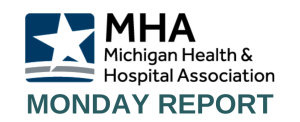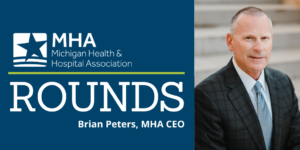
Workforce and Innovation Addressed by MHASC Board and HR Council
The MHA Service Corporation (MHASC) board focused its Feb. 7 meeting on supporting the MHA Strategic Action Plan priorities to address workforce support and innovation, viability, behavioral health improvement, health equity and more. The board …
Registration Open for 2024 Communications Retreat
Registration is open for the 2024 MHA Communications Retreat scheduled Tuesday, May 7 from 8:30 a.m. to 4 p.m. at the Henry Center for Executive Development in Lansing. The daylong event is geared toward the …
Online Learning Modules Created to Support Health Equity Programming
The MHA Keystone Center recently published an online learning module series to support hospitals and health systems in establishing and maintaining a health equity program compliant with new requirements from The Joint Commission and …
New CPT Codes for RSV Vaccine Administration
The Centers for Medicare & Medicaid Services added two new Current Procedural Terminology (CPT) codes for administration of monoclonal antibodies (Nirsevimab) for respiratory syncytial virus (RSV), for dates of service on and after Oct. …
Act Fast: Register for 2024 MHA HR Conference
Registration is open for the 2024 MHA Human Resources Conference, scheduled for March 5, 2024 at the ACH Hotel Marriott University Area, Lansing. Attending the conference provides human resource (HR) professionals with an opportunity …
Latest AHA Trustee Insights Highlights AI Controversies and Philanthropic Strategy
The February edition of Trustee Insights, the monthly digital package from the American Hospital Association (AHA), includes articles on artificial intelligence (AI) and philanthropy. There is no question that artificial intelligence will fundamentally transform healthcare. It …
The Keckley Report
Two Lawsuits. Two Issues. One Clear Message.

“Last Monday, two lawsuits were filed that strike at a fundamental challenge facing the U.S. health system …
The issue is this: is a health system’s liable when its consolidation activities result in higher prices for services provided communities and employers in communities where they operate? Is there a direct causal relationship between a system’s consolidation activities and their prices, and how should alleged harm be measured and remedied? …
Healthcare organizations and their trade groups can no longer defend against lack of transparency by defaulting to the complexity of our supply chains and payment systems. They’re excuses. The realities of generative AI and interoperability assure information driven healthcare that’s publicly accessible and inclusive of prices, costs, outcomes and business practices. In the process, the public’s interest will heighten and lawsuits will increase. …”
News to Know
- MHA offices will be closed and no formal meetings will be scheduled Feb. 19 in honor of President’s Day.
- The MHA is offering its popular Healthcare Leadership Academy program March 13-15 and May 1-2.
- The AHA’s Institute for Diversity and Health Equity recently launched their 2024 Diversity, Equity and Inclusion Survey.







